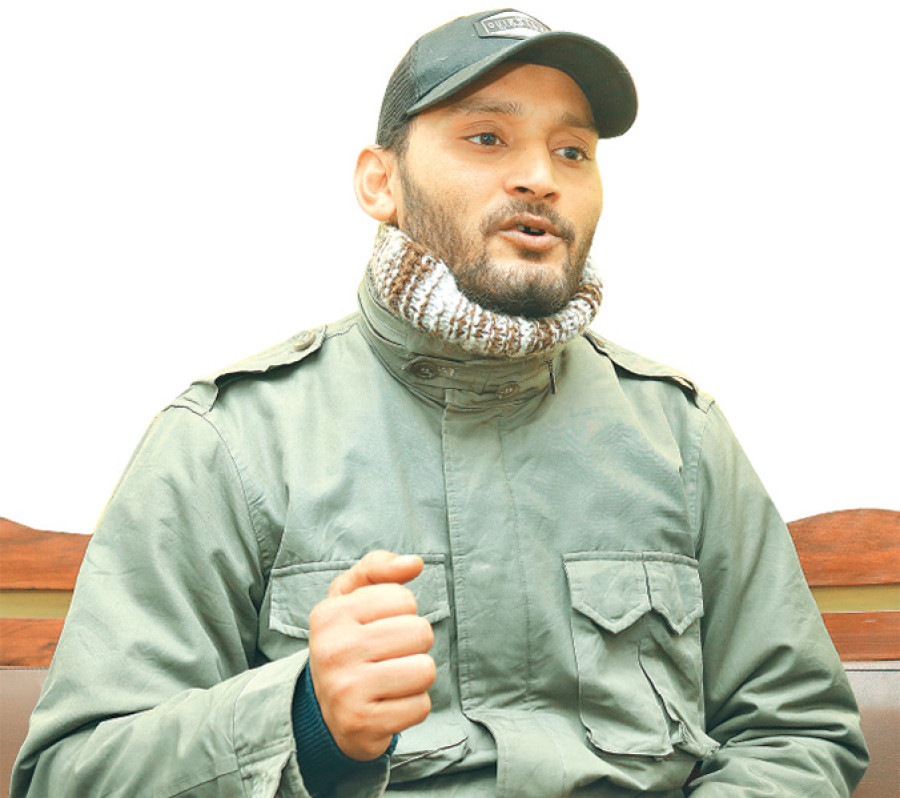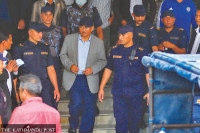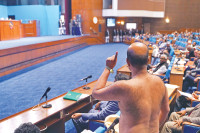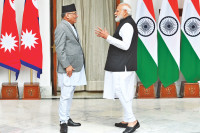Special Supplement
Method to the madness
Nepali film goers will remember for a while to come theconstricted, uncanny voice of the street goon Bhasme Don who made money by swindling gold swept into the Bagmati River during cremations. The character, after all, changed the concept of an antagonist in Nepali mainstream movies for ever. Bipin Karki, the man who played the character in the hit Pashupati Prasad, bagged several awards for his role. The awards were well deserved as he.
Anup Ojha
Nepali film goers will remember for a while to come theconstricted, uncanny voice of the street goon Bhasme Don who made money by swindling gold swept into the Bagmati River during cremations. The character, after all, changed the concept of an antagonist in Nepali mainstream movies for ever. Bipin Karki, the man who played the character in the hit Pashupati Prasad, bagged several awards for his role. The awards were well deserved as he.
Karki is one of the prominent method actors in Nepal. As part of the method acting technique, the actor not only portrays the character, but embodies the life of the character throughout the shooting of the movie. Karki had spent over two weeks in the slums of Chitwan in preparation of his role for Bindu in Chhadke and two months in a remote part of Mugu to align himself for his role in Kalo Pothi, also spent a week at the Aryaghat to fine tune his portrayal of Bhasme Don.
“When I get roped into a project, I read the complete story, and then I prepare for at least a month to get into the skin of my character,” Karki shares. But the process of method acting has had consequences in his personal life.
Karki, who is now a married man, says that his wife, Reshma Katwal, is often annoyed when he takes his character ‘home with him’. “Sometimes when I was angry, my wife can’t tell if I am in character or if my anger is genuine,” Karki says, “I was married a year ago, and my wife often got frustrated with what she calls my ‘ludicrous behaviour’, but now she enjoys when I am preparing for a role.”
Method acting has helped Karki burst into the limelight of late, but his journey to the silver screen started very early. Born on August 21, 1982 in Bahuni, Morang, Karki
started imitating Kamal Mani Nepal, his neighbour who played an active role in the staging of Kachahari Natak (forum theatre) during Karki’s school days. Karki remembers watching a drama that was meant for HIV/AIDS awareness in his village at the time, “The team had come from Dhankuta, and I realised on that day that acting could also be a powerful social tool.”
He was drawn to cinema and theatre, but he was not quite aware of his inner calling.
After completing his SLC examinations, Karki followed through on his parents’ request and went to Dhankuta to join a CMA (Certified Medical Assistance) course. After completing the course, he also completed a Primary Health Care training. But his mind remained unsettled and prodded him to move to Kathmandu in 1999, seeking other opportunities.
Once in Kathmandu, Karki enrolled for a Bachelor’s degree in English literature and Journalism at Ratna Rajya Campus, where he says, he “fell in love with poetry and stories, but did not have the energy for the rigors of the academic programme.”
After dropping out of the formal education system, Karki changed jobs, as if he were changing clothes. He worked for a liquor company and then tried his hands as a marketing officer for Radio Audio, but what he really enjoyed was stumbling upon a film crew and watching them shoot movies for hours on end. “Our financial condition was not that bad and that allowed me to do as I pleased––but my brother had instilled in me a sense of independence, so I was also looking for a job that I would actually enjoy,” he remembers.
Around that time, Kamal Mani Nepal, the neighbour Karki grew up imitating, had already established himself as a seasoned actor at the theatre house Aarohan Gurukul. Through Nepal, Karki found work as the backstage crew and sometimes got a look in as minor character in plays. “I tried my best to make my character noticeable,” Karki says.
These minor roles finally came to a head, when he made his presence felt during the People’s Movement of 2006. At the time, Aarohan Gurukul was leading the “Loktantrik Natak” movement and Karki was always in the front lines.
Following his stint in the protest-theatre, Karki, in 2008, finally joined Gurukul as an actor-in- training. “Sunil Pokharel (the director of the theatre company) learned my name after five years of working as a backstage crew.
Under his tutelage, my entire lifestyle, perception, and values changed–it was then that I learned the concept of method acting. I also learned that hard work and the ability to empathise with others is key to becoming a good actor,” he says.
Karki’s acting potential was further noticed by theatre enthusiasts when he replaced Saugat Malla and Karma in a play titled ‘Tara Baji Lai Lai’. “I was supposed to replace two people, and I created a character by merging two characters, which was highly appreciated,” he remembers.
Karki continued his association with Gurukul until they closed their doors in 2011. In that duration, he acted in over 20 plays and became one of the actors who made a successful migration from theatre to film. Since then, he has acted in seven feature films that have already been released and a few more that are in the pipeline.
These days, Karki remains fairly busy with film shootings or promotions; nonetheless, he also finds time for theatre, especially if it is the request of his teacher, Sunil Pokharel. Even when he was busy with the filming of Pashupati Prasad, he acted in Pokharel’s directorial venture, Roshomon. “Bhasme Don and Ghate from Roshomon were similar character,” he says, “And I did not have to make a mental switch when I switched roles.”
This year Karki made another comeback to theatre with Hariyo Dhunga, a play that revolves around the lives of Bhutanese refugees who were left out of the third country resettlement programmme. Hariyo Dhunga was also directed by his guru, Pokharel.
Karki’s return to stage has drawn a large number of his fans to the theatre, and the actor is not resting on his hard-earned laurels just yet. He remains hopeful that this audience will show him the love and support when he begins his own ventures as a director and a producer. “I am thinking of forming a production house. I want to project my own vision and work with a team that I feel I can grow with. My production house will start producing its own movies very soon,” he says, before remarking, “Imagine Bhasme Don helming a movie! Now, that would be something worth watching.”




 10.45°C Kathmandu
10.45°C Kathmandu.jpg)










